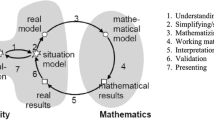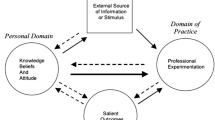Abstract
This paper considers the work carried out by online teacher educators and their professional development. We use the theoretical perspective of the documentational approach that focuses, in this case, on the interaction between teacher educators and the resources they use for their online training work. We thus study the following issues: (1) What kinds of resources do online teacher educators need, and how are such resources modified according to the educators’ specific skills and needs? (2) What specific skills are needed for setting up online training for mathematics teachers and how do these skills evolve as teacher education resources are used? We consider both questions simultaneously, while presenting results from a study within a specific teacher training programme in France that proposes “training paths” on a national platform. These “paths” are resources designed for teacher educators. We follow the appropriation of two training paths by two educator teams. The ways in which these educator teams were able to appropriate the paths give insights into the teacher educators’ skills and, as well, into the resources they need. By looking at their use of resources (as online mathematics teacher educators), we observe and analyse professional geneses, leading to the development of new skills.





Similar content being viewed by others
Notes
http://national.pairformance.education.fr. An English equivalent of the word “Pairform@nce” could be “Peertr@ining”, highlighting the principle of collaboration among teachers.
References
Adler, J. (2000). Conceptualising resources as a theme for teacher education. Journal of Mathematics Teacher Education, 3, 205–224.
Allen, R., Wallace, M., Cederberg, J., & Pearson, D. (1996). Teachers empowering teachers: vertically-integrated, inquiry-based geometry in school classrooms. Mathematics Teacher, 90(3), 254–255.
Alsawaie, O. N., & Alghazo, I. M. (2010). Enhancing mathematics beliefs and teaching efficacy of prospective teachers through an online video club. International Journal of Applied Educational Studies, 8(1), 44–56.
Artigue, M. (1998). Teacher training as a key issue for the integration of computer technologies. In J. D. Tinsley & D. C. Johnson (Eds.), Information and communication in school mathematics (pp. 121–129). London: Chapman and Hall.
Baran, B., & Cagiltay, K. (2010). The dynamics of online communities in the activity theory framework. Educational Technology & Society, 13(4), 155–166.
Borba, M. C., & Amaral, R. B. (2011). A model to teach teachers to become online teachers. In B. Ubuz (Ed.), Proceedings of the 35th Conference of the International Group for the Psychology of Mathematics Education (Vol. 1, p. 262). Ankara: PME.
Borba, M. C., & Gadanidis, G. (2008). Virtual communities and networks of practising mathematics teachers. In K. Krainer & T. Wood (Eds.), Participants in mathematics teachers education: Individuals, teams, communities and networks (Vol. 3, pp. 181–206). Rotterdam/Taipei: Sense Publishers.
Davis, E. A. (2006). Characterizing productive reflection among pre-service elementary teachers: seeing what matters. Teaching and Teacher Education, 22, 281–301.
García, M., Sánchez, V., Escudero, I., & Llinares, S. (2006). The dialectic relationship between theory and practice in mathematics teacher education. Journal of Mathematics Teacher Education, 9(2), 109–128.
Goos, M. E., & Bennison, A. (2008). Developing a communal identity as beginning teachers of mathematics: emergence of an online community of practice. Journal of Mathematics Teacher Education, 11(1), 41–60. doi:10.1007/s10857-007-9061-9.
Gueudet, G., Pepin, B., & Trouche, L. (2012). From textbooks to ‘lived’ resources: Mathematics curriculum materials and teacher documentation. New York: Springer.
Gueudet, G., & Trouche, L. (2009). Towards new documentation systems for mathematics teachers? Educational Studies in Mathematics, 71(3), 199–218. doi:10.1007/s10649-008-9159-8.
Gueudet, G., & Trouche, L. (2011). Mathematics teacher education advanced methods: an example in dynamic geometry. ZDM—The International Journal on Mathematics Education, 43(3), 399–411.
Guin, D., & Trouche, L. (1999). The complex process of converting tools into mathematical instruments: the case of calculators. International Journal of Computers for Mathematical Learning, 3, 195–227.
Jaworski, B. (2008). Building and sustaining inquiry communities in mathematics teaching development. In K. Krainer & T. Woods (Eds.), Participants in mathematics teachers education (Vol. 3, pp. 309–330). Rotterdam/Taipei: Sense Publishers.
Krainer, K., & Wood, T. (Eds.). (2008). Participants in mathematics teachers education: Individuals, teams, communities and networks (Vol. 3). Rotterdam/Taipei: Sense Publishers.
Llinares, S., & Krainer, K. (2006). Mathematics (student) teachers and teacher educators as learners. In A. Gutierrez & P. Boero (Eds.), Handbook of research on the psychology of mathematics education (pp. 429–459). Rotterdam/Taipei: Sense Publishers.
Llinares, S., & Olivero, F. (2008). Virtual communities and networks of prospective mathematics teachers. Technologies, interactions, and new forms of discourse. In K. Krainer & T. Woods (Eds.), Participants in mathematics teachers education (Vol. 3, pp. 155–179). Rotterdam/Taipei: Sense Publishers.
Llinares, S., & Valls, J. (2009). The building of pre-service primary teachers’ knowledge of mathematics teaching: interaction and online video case studies. Instructional Science, 37(3), 247–271. doi:10.1007/s11251-007-9043-4.
Llinares, S., & Valls, J. (2010). Prospective primary mathematics teachers’ learning from on-line discussions in a virtual video-based environment. Journal of Mathematics Teacher Education, 13(2), 177–196. doi:10.1007/s10857-009-9133-0.
McGraw, R., Lynch, K., Koc, Y., Budak, A., & Brown, C. A. (2007). The multimedia case as a tool for professional development: an analysis of online and face-to-face interaction among mathematics pre-service teachers, in-service teachers, mathematicians, and mathematics teacher educators. Journal of Mathematics Teacher Education, 10(2), 95–121. doi:10.1007/s10857-007-9030-3.
Moore-Russo, D., Viglietti, J., & Bateman, S. (2009). Teachers’ use of online mathematics education resources: insights on digital natives and proficient digital immigrants. In Swars, S. L., Stinson, D. W., & Lemons-Smith, S. (Eds.). Proceedings of the 31st annual meeting of the North American Chapter of the International Group for the Psychology of Mathematics Education (Vol. 5, pp. 1505–1512). Georgia State University, Atlanta, GA.
Orleans, A. V. (2010). Enhancing teacher competence through online training. Asia-Pacific Education Researcher, 19(3), 371–386.
Osguthorpe, R. T., & Graham, C. R. (2003). Blended learning environments. The Quarterly Review of Distance Education, 4(3), 227–233.
Parada, S. E., Sacristán, A. I., Pluvinage, F. (2012). Primeras reflexiones sobre la actividad matemática promovida en el aula al interior de comunidades de práctica. In A. Oktaç, Y. Chavez, O. Covian, J. M. Lopez, M. E. Méndez (Eds.), Memorias del Primer Coloquio de Doctorado del Departamento de Matemática Educativa (pp. 127–138). México D.F.: Cinvestav—IPN
Remillard, J. T. (2012). Modes of engagement: Understanding teachers’ transactions with mathematics curriculum resources. In G. Gueudet, B. Pepin, & L. Trouche (Eds.), From textbooks to ‘lived’ resources: Mathematics curriculum materials and teacher documentation (pp. 105–122). New York: Springer.
Salaün, J.-M. (2011). Immeasurable library economics. In I. Rizzo & A. Mignosa (Eds.), Handbook on the economics of cultural heritage. Cheltenham/Northampton, MA: Edward Elgar Publishing.
Sanchez, M. (2010). Orquestración documentacional: herramienta para la estructuración y el análisis del trabajo documentacional colectivo en linea. Recherches en Didactique des Mathématiques, 30(3), 367–397.
Santos, L., & da Ponte, J. P. (2003). An experience in distance in-service teacher education. In Proceedings of CERME3 (3rd conference of the European society for research in mathematics education). http://ermeweb.free.fr/CERME3/tableofcontents_cerme3.html. Accessed 18 Apr 2012.
Trouche, L., & Guin, D. (2005). Distance training, a key mode to support teachers in the integration of ICT? In M. Bosch (Ed.), Proceedings of the fourth European conference on research on mathematics education (pp. 1020–1029). FUNDEMI IQS—Universitat Ramon Llull http://ermeweb.free.fr/CERME4/CERME4_WG9.pdf. Accessed 18 Apr 2012.
Trouche, L., Drijvers, P., Gueudet, G., & Sacristan, A. I. (2012). Technology-driven developments and policy implications for mathematics education. In A. J. Bishop, M. A. Clements, C. Keitel, J. Kilpatrick, & F. K. S. Leung (Eds.), Third international handbook of mathematics education. Dordrecht: Springer (in press).
Vygotski, L. (1978). Mind in society: The development of higher psychological processes. Cambridge, MA: Harvard University Press.
Wenger, E. (1998). Communities of practice: Learning, meaning, and identity. Cambridge: Cambridge University Press.
Acknowledgments
The authors warmly thank Lulu Healy for her help with the English language revisions of this paper.
Author information
Authors and Affiliations
Corresponding author
Appendices
Appendix 1: Extract from the teacher educators’ logbook on the training path “individualisation” (our translation)
Used resources | Productions, indicate if they are adapted from resources of the path | Development | Comments | |
|---|---|---|---|---|
… | ||||
Analysing the resources of the training path on individualisation | Period from 9/18/08 to 10/19/09: video conferencing and emails | It seems that the proposed resources do not explain enough of the individualisation aspect where pupils work on the same mathematical object, but at different levels | ||
Adapting the path to constraints | Our notes made during two video conferences | First face-to-face meeting agenda | 10/16/08 audio-conferencing with Skype from 7:30 p.m. to 11:30 p.m. | The number of face-to-face meetings and the lack of trainees from the same school let us foresee that cross observations among trainees will be difficult to achieve |
Adaptation of the training session schedule | ||||
Booking of the computer lab at IREM for the first face-to-face meeting | ||||
We do not find an example of agenda for the face-to-face meeting | ||||
10/18/08 video-conferencing with Skype 8:30 p.m. to 11:30 p.m. | ||||
Individual work | ||||
Email exchange | ||||
First face-to-face meeting | The agenda of the day | The slideshow adapted with our names and platform | 10/23/08 from 9 a.m. to 4:30 p.m. | See the agenda of the first face-to-face meeting |
Every resource of stage one of the path | ||||
The technical settings of the first face-to-face meeting were difficult (breakdown of the computer lab during all the morning, moving of the group on another site…) | ||||
The examples of the planned sessions from the ZEP-IREM group in Montpellier | ||||
The examples of use from the Mathenpoche group of the IREM in Lorraine | ||||
Presentation of the slideshow “individualisation” was not possible | ||||
The leaflet to activate a session with Wims |
Appendix 2: Lesson model in the training path “individualisation” (our translation)
Description of the lesson | ||||
|---|---|---|---|---|
Theme/class | ||||
Teaching objective | ||||
Prerequisite | ||||
Online repository used | ||||
Other ICT tools used | ||||
Number of course sessions and duration |
Session | Type of session (1) | Pedagogical structure (2) | Precise objective | Material used (3) |
|---|---|---|---|---|
S1 | ||||
S2 | ||||
… |
-
1.
Introduction, revision, construction, training, remediation, evaluation, etc. The sessions that include Individualisation are mentioned in italics.
-
2.
Whole class, half-class, place, individual work, work in pairs, etc. In the case of group work, indicate the composition of the groups: homogeneous groups, heterogeneous groups, groups formed after a diagnostic, etc.
-
3.
Indicate the precise references: extract of a textbook, or file (insert a link to the file in this case).
Rights and permissions
About this article
Cite this article
Gueudet, G., Sacristán, A.I., Soury-Lavergne, S. et al. Online paths in mathematics teacher training: new resources and new skills for teacher educators. ZDM Mathematics Education 44, 717–731 (2012). https://doi.org/10.1007/s11858-012-0424-z
Accepted:
Published:
Issue Date:
DOI: https://doi.org/10.1007/s11858-012-0424-z




